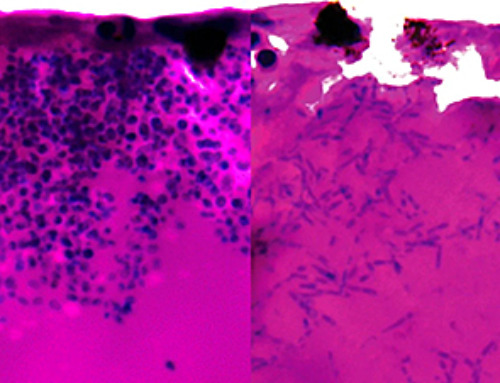A surprising discovery reveals that a gene previously thought to accelerate esophageal cancer actually helps protect against it initially.
This pivotal study could lead to better prediction and prevention strategies tailored to individual genetic profiles.
Shifting Paradigms in Cancer Genetics
A genetic mutation long thought to drive oesophageal cancer may actually have a protective role in the early stages of the disease, according to new research published today (January 3) in Nature Cancer. This surprising finding could help doctors better assess who is most at risk of developing cancer, paving the way for more targeted and effective prevention strategies.
“We often assume that mutations in cancer genes are bad news, but that’s not the whole story,” explains lead researcher Francesca Ciccarelli, Professor of Cancer Genomics at Queen Mary University of London’s Barts Cancer Institute and Principal Group Leader at the Francis Crick Institute, where the experimental work in this study took place. “The context is crucial. These results support a paradigm shift in how we think about the effect of mutations in cancer.”
Rethinking Esophageal Cancer Risk Factors
Just 12% of patients with esophageal cancer in England survive their disease for 10 years or more. The UK has one of the world’s highest incidences of a subtype called esophageal adenocarcinoma, and cases continue to increase. this cancer type develops from a condition called Barrett’s esophagus, in which the cells lining the esophagus become abnormal. however, only around 1% of people with Barrett’s go on to develop cancer each year. in the new study, the research team sought to better understand why some cases of Barrett’s lead to cancer, while others do not, to support better prediction and treatment of esophageal adenocarcinoma.
The team analyzed a large gene sequencing dataset from more than 1,000 people with esophageal adenocarcinoma and more than 350 people with Barrett’s esophagus, including samples from the Occams Consortium.[1] they found that defects in a gene called CDKN2A were more common in people with Barrett’s esophagus who never progressed to cancer. This finding was unexpected, as CDKN2A is commonly lost in various cancers and is well-known as a tumor suppressor gene – a molecular safeguard that stops cancer from forming.
The Dual Role of CDKN2A in Cancer Progression
The research showed that if normal cells in our esophagus lose CDKN2A, it helps promote the development of Barrett’s esophagus. However, it also protects cells against the loss of another key gene encoding p53 – a critical tumor suppressor often dubbed the ‘guardian of the genome’. Loss of p53 strongly drives the progression of disease from Barrett’s to cancer.
The team found that potentially cancerous cells that lost both CDKN2A and p53 were weakened and unable to compete with other cells around them, preventing cancer from taking root. In contrast, if cancer cells lose CDKN2A after the disease has had time to develop, it promotes a more aggressive disease and worse outcomes for patients.
A Gene With Two Faces
Professor Ciccarelli likens the dual role of CDKN2A to the ancient Roman god of transitions Janus, after whom January is named. Janus has two faces – one looking to the past and one to the future.
“It can be tempting to look at cancer mutations as good or bad, black or white. But like Janus, they can have multiple faces – a dual nature,” she explains. “We’re increasingly learning that we all accumulate mutations as an inevitable part of aging. Our findings challenge the simplistic perception that these mutations are ticking time bombs and show that, in some cases, they can even be protective.”
The findings could have significant implications for how we assess cancer risk. They suggest that if a person with Barrett’s esophagus has an early CDKN2A mutation but no mutations in p53, it could indicate that their condition is less likely to progress to cancer. On the other hand, later in the disease, CDKN2A mutations may signal a poor prognosis. Further research is needed to determine how to best apply this new knowledge to benefit patients in the clinic.
Advances in Cancer Research and Funding
Science Engagement Manager at Cancer Research UK, Dr Nisharnthi Duggan, said: “Survival for esophageal cancer has improved since the 1970s, but it’s still one of the most challenging cancers to treat. This is largely because it’s often diagnosed at advanced stages, when treatments are less likely to be successful.
“Funding research like this is critical to advancing our understanding and improving outcomes for people affected by the disease. It shows the importance of discovery science in unraveling the complexities of cancer, so we can identify new ways to prevent, detect, and treat it.”
Notes
- OCCAMS consortium = the Oesophageal Cancer Clinical and Molecular Stratification is a network of clinical centers across the UK recruiting patients with esophageal and gastro-esophageal junction (GOJ) adenocarcinoma
Reference: “Context-dependent effects of CDKN2A and other 9p21 gene losses during the evolution of oesophageal cancer” by Piyali Ganguli, et al., 3 January 2025, Nature Cancer.
DOI: 10.1101/2024.01.24.576991
This research was funded by Cancer Research UK and the experimental work in this study took place at the Francis Crick Institute.
News
Does being infected or vaccinated first influence COVID-19 immunity?
A new study analyzing the immune response to COVID-19 in a Catalan cohort of health workers sheds light on an important question: does it matter whether a person was first infected or first vaccinated? [...]
We May Never Know if AI Is Conscious, Says Cambridge Philosopher
As claims about conscious AI grow louder, a Cambridge philosopher argues that we lack the evidence to know whether machines can truly be conscious, let alone morally significant. A philosopher at the University of [...]
AI Helped Scientists Stop a Virus With One Tiny Change
Using AI, researchers identified one tiny molecular interaction that viruses need to infect cells. Disrupting it stopped the virus before infection could begin. Washington State University scientists have uncovered a method to interfere with a key [...]
Deadly Hospital Fungus May Finally Have a Weakness
A deadly, drug-resistant hospital fungus may finally have a weakness—and scientists think they’ve found it. Researchers have identified a genetic process that could open the door to new treatments for a dangerous fungal infection [...]
Fever-Proof Bird Flu Variant Could Fuel the Next Pandemic
Bird flu viruses present a significant risk to humans because they can continue replicating at temperatures higher than a typical fever. Fever is one of the body’s main tools for slowing or stopping viral [...]
What could the future of nanoscience look like?
Society has a lot to thank for nanoscience. From improved health monitoring to reducing the size of electronics, scientists’ ability to delve deeper and better understand chemistry at the nanoscale has opened up numerous [...]
Scientists Melt Cancer’s Hidden “Power Hubs” and Stop Tumor Growth
Researchers discovered that in a rare kidney cancer, RNA builds droplet-like hubs that act as growth control centers inside tumor cells. By engineering a molecular switch to dissolve these hubs, they were able to halt cancer [...]
Platelet-inspired nanoparticles could improve treatment of inflammatory diseases
Scientists have developed platelet-inspired nanoparticles that deliver anti-inflammatory drugs directly to brain-computer interface implants, doubling their effectiveness. Scientists have found a way to improve the performance of brain-computer interface (BCI) electrodes by delivering anti-inflammatory drugs directly [...]
After 150 years, a new chapter in cancer therapy is finally beginning
For decades, researchers have been looking for ways to destroy cancer cells in a targeted manner without further weakening the body. But for many patients whose immune system is severely impaired by chemotherapy or radiation, [...]
Older chemical libraries show promise for fighting resistant strains of COVID-19 virus
SARS‑CoV‑2, the virus that causes COVID-19, continues to mutate, with some newer strains becoming less responsive to current antiviral treatments like Paxlovid. Now, University of California San Diego scientists and an international team of [...]
Lower doses of immunotherapy for skin cancer give better results, study suggests
According to a new study, lower doses of approved immunotherapy for malignant melanoma can give better results against tumors, while reducing side effects. This is reported by researchers at Karolinska Institutet in the Journal of the National [...]
Researchers highlight five pathways through which microplastics can harm the brain
Microplastics could be fueling neurodegenerative diseases like Alzheimer's and Parkinson's, with a new study highlighting five ways microplastics can trigger inflammation and damage in the brain. More than 57 million people live with dementia, [...]
Tiny Metal Nanodots Obliterate Cancer Cells While Largely Sparing Healthy Tissue
Scientists have developed tiny metal-oxide particles that push cancer cells past their stress limits while sparing healthy tissue. An international team led by RMIT University has developed tiny particles called nanodots, crafted from a metallic compound, [...]
Gold Nanoclusters Could Supercharge Quantum Computers
Researchers found that gold “super atoms” can behave like the atoms in top-tier quantum systems—only far easier to scale. These tiny clusters can be customized at the molecular level, offering a powerful, tunable foundation [...]
A single shot of HPV vaccine may be enough to fight cervical cancer, study finds
WASHINGTON -- A single HPV vaccination appears just as effective as two doses at preventing the viral infection that causes cervical cancer, researchers reported Wednesday. HPV, or human papillomavirus, is very common and spread [...]
New technique overcomes technological barrier in 3D brain imaging
Scientists at the Swiss Light Source SLS have succeeded in mapping a piece of brain tissue in 3D at unprecedented resolution using X-rays, non-destructively. The breakthrough overcomes a long-standing technological barrier that had limited [...]





















